英语八大时态_讲解
英语中常见的八大时态(结构及用法)
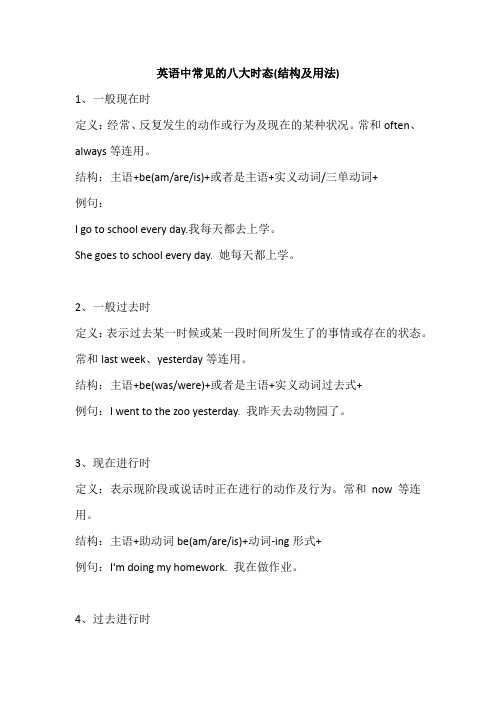
英语中常见的八大时态(结构及用法)1、一般现在时定义:经常、反复发生的动作或行为及现在的某种状况。
常和often、always等连用。
结构:主语+be(am/are/is)+或者是主语+实义动词/三单动词+例句:I go to school every day.我每天都去上学。
She goes to school every day. 她每天都上学。
2、一般过去时定义:表示过去某一时候或某一段时间所发生了的事情或存在的状态。
常和last week、yesterday等连用。
结构:主语+be(was/were)+或者是主语+实义动词过去式+例句:I went to the zoo yesterday. 我昨天去动物园了。
3、现在进行时定义:表示现阶段或说话时正在进行的动作及行为。
常和now等连用。
结构:主语+助动词be(am/are/is)+动词-ing形式+例句:I'm doing my homework. 我在做作业。
4、过去进行时定义:表示在过去某个时间点发生或进行的行为的事情。
常和at this time yesterday等或以when引导的谓语动词连用。
结构:主语+助动词be(was/were)+动词-ing形式+例句:When I got to the top of the mountain, the sun was shining. 我到达山顶时,阳光灿烂。
5、现在完成时定义:表示过去发生的动作对现在造成的影响或结果或过去的动作或状态持续到现在。
构成:主语+助动词(have/has)+动词过去分词+例句:I have lived here for more than twenty years. 我住在这儿二十多年了。
6、过去完成时定义:表示在过去某一时刻或动作以前完成了的动作,也可以说过去的时间关于过去的动作。
构成:主语+助动词(have/has)+动词过去分词+例句:She said she had never been to Paris. 她告诉我她曾去过巴黎。
初中英语时态8种基本时态讲解
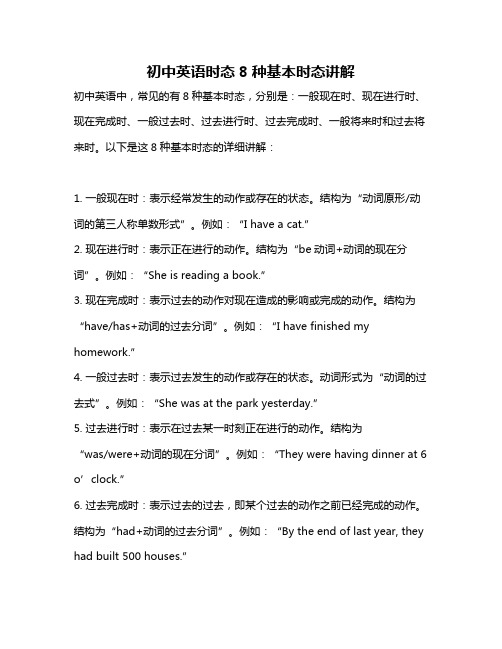
初中英语时态8种基本时态讲解初中英语中,常见的有8种基本时态,分别是:一般现在时、现在进行时、现在完成时、一般过去时、过去进行时、过去完成时、一般将来时和过去将来时。
以下是这8种基本时态的详细讲解:1. 一般现在时:表示经常发生的动作或存在的状态。
结构为“动词原形/动词的第三人称单数形式”。
例如:“I have a cat.”2. 现在进行时:表示正在进行的动作。
结构为“be动词+动词的现在分词”。
例如:“She is reading a book.”3. 现在完成时:表示过去的动作对现在造成的影响或完成的动作。
结构为“have/has+动词的过去分词”。
例如:“I have finished my homework.”4. 一般过去时:表示过去发生的动作或存在的状态。
动词形式为“动词的过去式”。
例如:“She was at the park yesterday.”5. 过去进行时:表示在过去某一时刻正在进行的动作。
结构为“was/were+动词的现在分词”。
例如:“They were having dinner at 6 o’clock.”6. 过去完成时:表示过去的过去,即某个过去的动作之前已经完成的动作。
结构为“had+动词的过去分词”。
例如:“By the end of last year, they had built 500 houses.”7. 一般将来时:表示将来要发生的动作或存在的状态。
结构为“will+动词原形”或“am/is/are going to+动词原形”。
例如:“We will visit the museum next week.”8. 过去将来时:表示从过去的某一时刻看,将来要发生的动作或存在的状态。
结构为“would+动词原形”或“was/were going to+动词原形”。
例如:“He said he would come back soon.”以上就是初中英语8种基本时态的讲解,希望对你有帮助!。
初中英语必考-八大时态结构及用法详解
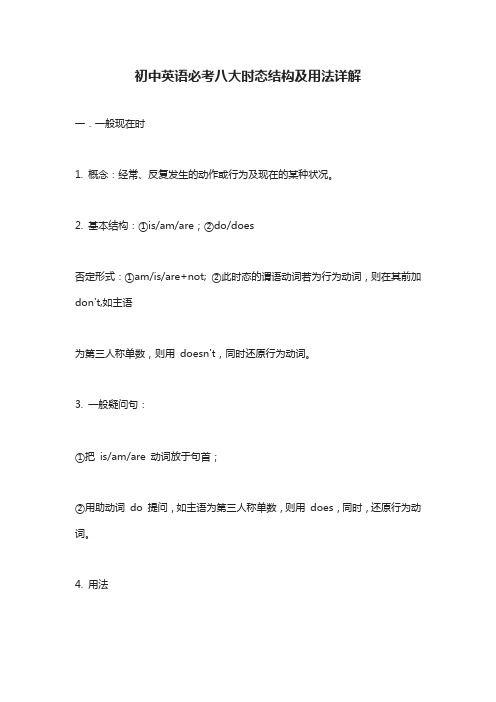
初中英语必考八大时态结构及用法详解一.一般现在时1. 概念:经常、反复发生的动作或行为及现在的某种状况。
2. 基本结构:①is/am/are;②do/does否定形式:①am/is/are+not; ②此时态的谓语动词若为行为动词,则在其前加don't,如主语为第三人称单数,则用doesn't,同时还原行为动词。
3. 一般疑问句:①把is/am/are 动词放于句首;②用助动词do 提问,如主语为第三人称单数,则用does,同时,还原行为动词。
4. 用法1)经常性或习惯性的动作,常与表示频度的时间状语连用。
例如:I leave home for school at 7 every morning. 每天早上我七点离开家。
2)客观真理,客观存在,科学事实。
例如:The earth moves around the sun. 地球绕太阳转动。
Shanghai lies in the east ofChina. 上海位于中国东部。
3)表示格言或警句。
例如:Pride goes before a fall 骄者必败。
注意:此用法如果出现在宾语从句中,即使主句是过去时,从句谓语也要用一般现在时。
例如:Columbus proved that the earth is round. 哥伦布证实了地球是圆的。
4)现在时刻的状态、能力、性格、个性。
例如:I don't want so much. 我不要那么多。
Ann writes good English but does not speak well.安英语写得不错,讲的可不行。
5)一般现在时表示将来含义。
a. 下列动词come, go, arrive, leave, start, begin, return 的一般现在时可以表示将来,主要用来表示在时间上已确定或安排好的事情。
例如:The train leaves at six tomorrow morning. 火车明天上午六点开。
八大时态讲解(共26张PPT)

0 一般过去将来时:
He was sixty-eight. In two years he would be seventy.
I knew you would agree.
0 现在英进行语时的: 动词时态(进行) What are you doing?
算;
如:I am going to listen to music. (我打算听音乐) will /shall 表示未事先思考或为计划过的意图
如:It will be Christmas soon .(很快就圣诞节了)
4. 现在进行时态( The Present Continuous Tense )
5、我们离开广州六年了。
We have left Guangzhou for 6 years . ×
We have been away from Guangzhou for 6
years .
3.常见句型
1) 主句(现在完成时)+since 从句(一般过去时).
2) It is +一段时间+ since 从句(一般过去时).
has gone to
He said had seen this morning, …ago, etc
that he _________the film many 如果明天不下雨,我们将去野营。
He has borrowed the pen for three days .
times. 现在进行时态( The Present Continuous Tense )
was /were going to +动词原形
初中英语八种时态详解

初中英语八种时态详解一.一般现在时一.要点提示一般现在时主要用动词原形表示,但是当主语是第三人称单数或者单数名词时,动词的形式要发生变化,其变化规律是:1. 一般动词后加-s, 如:wears, reads, plays, likes, 2.以s, x, ch, sh结尾,后加-es, 如:watches, brushes, 3.以辅音字母+o结尾,一般加-es, 如:goes, does, 4.辅音字母+y 结尾,变y为i,再加-es, 如:worries, carries. Be动词一般现在时的特殊形态是:am, is, are。
Have的第三人称单数是has。
二.用法指南一般现在时的用法1) 表示经常性或习惯性的动作,常与表示频度的时间状语连用。
时间状语:always总是, often经常,usually通常, seldom很少, never从不, sometimes有时(以上频度副词位置放于行为动词之前), every…每…(放于句首或者句末均可)I leave home for school at 7 every morning.It often snows here.2) 表示现在的状态、特征、能力、性格等。
I know him very well.Ann Wang writes good English but does not speak well.3) 表示格言或警句中。
Pride goes before a fall. 骄者必败。
Failure is the mother of success. 失败是成功之母。
4) 表示客观真理,客观存在,科学事实。
The earth moves around the sun.Shanghai lies in the east of China.三. 一般现在时态的肯定形式,否定形式及疑问形式肯定形式是用动词原形,be动词用am, is, are, 注:动词的第三人称单数形式的变化;否定形式是在be动词后加否定词not(缩写成isn’t, aren’t, am与not不能缩写),或者添加助动词do/does加not再加动词原形(缩写成don’t/doesn’t).疑问形式是把be动词或助动词do/does提置句首, 动词还原,句末问号,人称上第一人称变第二人称,第二人称变第一人称,第三人称不变。
八大时态用法及详解
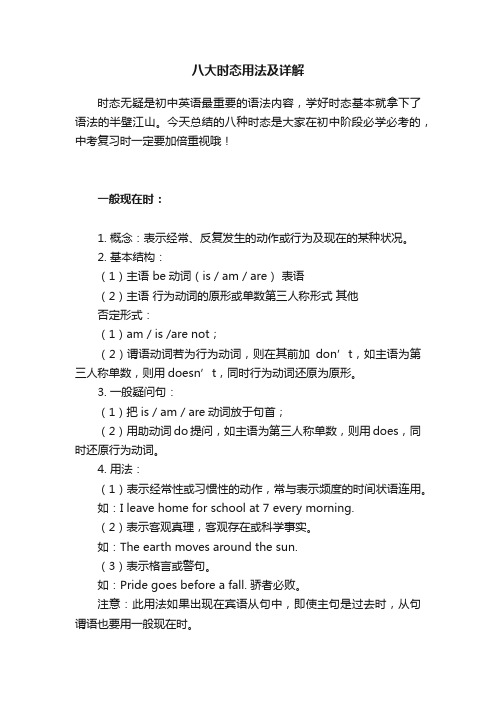
八大时态用法及详解时态无疑是初中英语最重要的语法内容,学好时态基本就拿下了语法的半壁江山。
今天总结的八种时态是大家在初中阶段必学必考的,中考复习时一定要加倍重视哦!一般现在时:1. 概念:表示经常、反复发生的动作或行为及现在的某种状况。
2. 基本结构:(1)主语 be动词(is / am / are)表语(2)主语行为动词的原形或单数第三人称形式其他否定形式:(1)am / is /are not;(2)谓语动词若为行为动词,则在其前加don’t,如主语为第三人称单数,则用doesn’t,同时行为动词还原为原形。
3. 一般疑问句:(1)把is / am / are动词放于句首;(2)用助动词do提问,如主语为第三人称单数,则用does,同时还原行为动词。
4. 用法:(1)表示经常性或习惯性的动作,常与表示频度的时间状语连用。
如:I leave home for school at 7 every morning.(2)表示客观真理,客观存在或科学事实。
如:The earth moves around the sun.(3)表示格言或警句。
如:Pride goes before a fall. 骄者必败。
注意:此用法如果出现在宾语从句中,即使主句是过去时,从句谓语也要用一般现在时。
如:Columbus proved that the earth is round.(4)表示现在时刻的状态、能力、性格、个性等。
如:I don’t want so much.Ann writes good English but does not speak well.(5)一般现在时表示将来含义① come, go, arrive, leave, start, begin, return的一般现在时可以表示将来,主要用来表示在时间上已确定或安排好的事情。
如:The train leaves at six tomorrow morning.— When does the bus star?— It stars in ten minutes.② 在时间或条件状语句中。
英语八大时态详细讲解
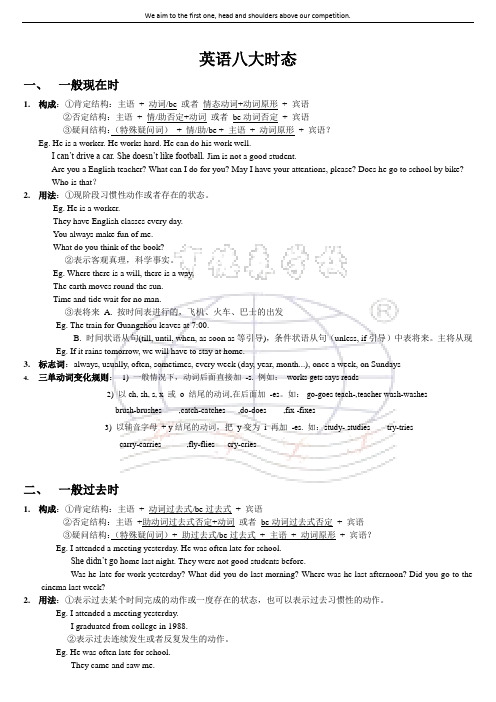
5.不规则变化
六、过去进行时
1.构成:①肯定结构:主语+was/were + doing+ (宾语)
②否定结构:主语+was/were not + doing+ (宾语)
④不能用于进行时的动词:A.表示感觉的(feel, smell, sound, taste)
Eg. The plan sounds good.
B.表示感情、拥有关系、状态或思想的动词:agree, believe, belong, contain, hate, hear, like, love, mind, possess, seem, understand, want等
Eg. I wasgoingto leave when it began to rain.
He looked as if he was about to burst into tears.
③was/were to do和was/were doing:
Eg. I was seeing off my sister at the station the next day.
4)重读闭音节,双写词尾辅音字母加ed.如: preferred(重读在fer前); admittedstopped
三、一般将来时
1.结构:①肯定结构:主语+be going to + do或者will/shall + do+宾语
②否定结构:主语+be not going to + do或者will/shall not + do+宾语
He is not going to play basketball this weekend.
英语的八大时态用法详解

英语八大时态用法详解一.一般现在时1. 概念:表示经常、反复发生的动作或行为及现在的某种状况。
2. 基本结构:(1)主语+ be动词(is / am / are)+表语(2)主语+ 行为动词的原形或单数第三人称形式+其他(3)There be 句型:There is / are +n. +介词短语 is / are 根据n. 的单复数决定。
否定形式:(1)am / is /are + not;(2)谓语动词若为行为动词,则在其前加don’t,如主语为第三人称单数,则用doesn’t,同时行为动词还原为原形。
(3)There is / are not +n. +介词短语一般疑问句:(1)把is / am / are动词放于句首;(2)用助动词do提问,如主语为第三人称单数,则用does,同时还原行为动词;(3))There is / are +n. +介词短语: is / are动词放于句首。
3.标志性时间状语:(1)on + 星期s = every 星期(2)once / twice/ three times a week (month / year …)(3)频度副词always / usually / often / sometimes=at times= (every)once in a while / seldom / never(不绝对)(4)in the mornings / afternoons / evenings = every morning / afternoon/ evening 4.用法:(1)表示经常性或习惯性的动作,常与表示频度的时间状语连用。
如:I leave home for school at 7 every morning.(2)表示客观真理,客观存在或科学事实。
如:The earth moves around the sun.(3)表示格言或警句。
如:Pride goes before a fall. 骄者必败。
8大时态详解

8大时态详解
英语中的八大时态包括:一般现在时、一般过去时、一般将来时、过去将来时、现在进行时、过去进行时、现在完成时和过去完成时。
下面是对每一个时态的详细解释:
1. 一般现在时:表示经常性或习惯性的动作,常与表频度的时间状语连用;也表示现在的状态、特征、职业、能力、感觉等;还用于表述真理、客观存在、科学事实或用于格言警句中。
2. 一般过去时:表示过去某个时间发生的动作或存在的状态,常和表示过去的时间状语连用。
3. 一般将来时:用来表示将要发生的动作或存在的状态。
4. 过去将来时:表示在过去某一时间看来将要发生的动作或存在的状态。
5. 现在进行时:用来描述现在正在进行的动作。
6. 过去进行时:表示在过去某一时刻或某一段时间内正在进行的动作。
7. 现在完成时:表示动作从过去某一时间开始一直延续到现在,可能刚刚结束,也可能还要继续进行下去。
8. 过去完成时:表示动作在过去某一时间之前已经完成。
英语八种时态讲解
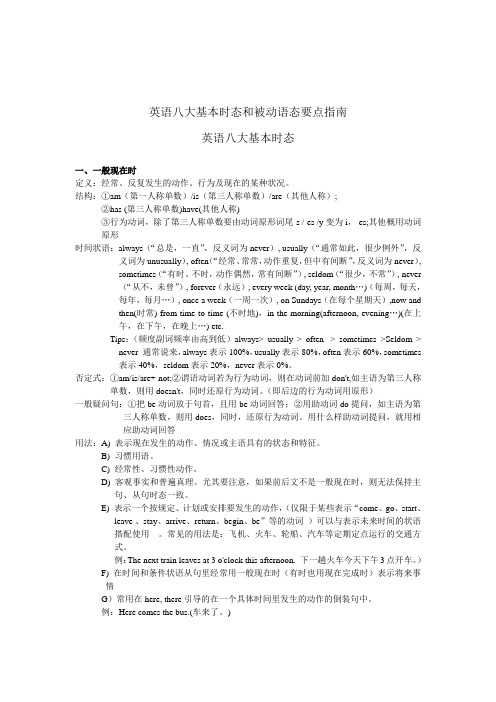
英语八大基本时态和被动语态要点指南英语八大基本时态一、一般现在时定义:经常、反复发生的动作、行为及现在的某种状况。
结构:①am(第一人称单数)/is(第三人称单数)/are(其他人称);②has (第三人称单数)have(其他人称)③行为动词,除了第三人称单数要由动词原形词尾-s /-es /y变为i,-es;其他概用动词原形时间状语:always(“总是,一直”,反义词为never), usually(“通常如此,很少例外”,反义词为unusually), often(“经常、常常,动作重复,但中有间断”,反义词为never),sometimes(“有时、不时,动作偶然,常有间断”), seldom(“很少,不常”), never(“从不,未曾”), forever(永远), every week (day, year, month…)(每周,每天,每年,每月…), once a week(一周一次), on Sundays(在每个星期天),now andthen(时常) from time to time (不时地),in the morning(afternoon, evening…)(在上午,在下午,在晚上…) etc.Tips:(频度副词频率由高到低)always> usually > often > sometimes >Seldom >never 通常说来,always表示100%,usually表示80%,often表示60%,sometimes表示40%,seldom表示20%,never表示0%。
否定式:①am/is/are+ not;②谓语动词若为行为动词,则在动词前加don't,如主语为第三人称单数,则用doesn't,同时还原行为动词。
(即后边的行为动词用原形)一般疑问句:①把be动词放于句首,且用be动词回答;②用助动词do提问,如主语为第三人称单数,则用does,同时,还原行为动词。
八大时态讲解
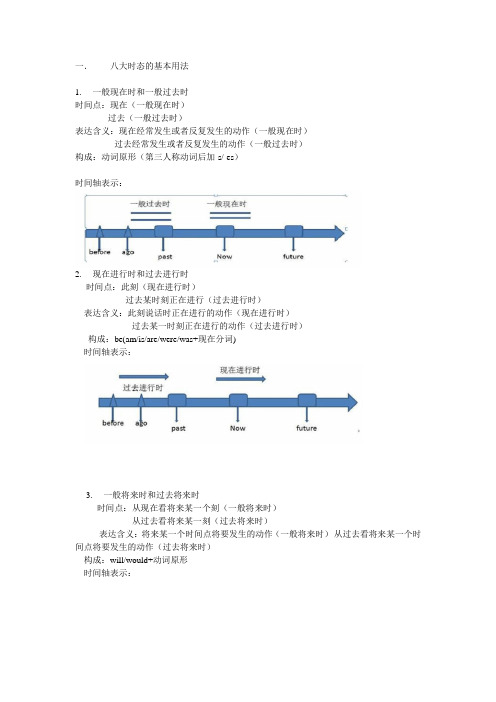
一.八大时态的基本用法1. 一般现在时和一般过去时时间点:现在(一般现在时)过去(一般过去时)表达含义:现在经常发生或者反复发生的动作(一般现在时)过去经常发生或者反复发生的动作(一般过去时)构成:动词原形(第三人称动词后加-s/-es)时间轴表示:2. 现在进行时和过去进行时时间点:此刻(现在进行时)过去某时刻正在进行(过去进行时)表达含义:此刻说话时正在进行的动作(现在进行时)过去某一时刻正在进行的动作(过去进行时)构成:be(am/is/are/were/was+现在分词)时间轴表示:3. 一般将来时和过去将来时时间点:从现在看将来某一个刻(一般将来时)从过去看将来某一刻(过去将来时)表达含义:将来某一个时间点将要发生的动作(一般将来时)从过去看将来某一个时间点将要发生的动作(过去将来时)构成:will/would+动词原形时间轴表示:4. 现在完成时和过去完成时时间点:时间截止到目前为止动作已经完成(现在完成时)时间截止到过去某一刻动作已经完成(过去完成时)表达含义:强调不久前发生的动作对现在产生的影响(现在完成时)表示一个动作在过去某一个时间或动作之前已经完成(过去完成时)构成:have/has/had+动词过去分词时间轴表示:二、八大时态的特殊用法1.一般现在时的特殊用法①在时间或者条件状语从句中一般现在时可以表示将来。
I will discuss this with you when we meet next time. 下次见面时咱们再讨论。
②在表示按时间表拟定的或者安排好的就要发生的事情或者动作时,用一般现在时表示将来。
The train arrives at 9. There’s plenty of time. 火车九点到达,还有充足的时间。
2. 现在进行时的特殊用法①有时,现在进行时可以表示按照计划安排将要发生的动作,特别是使用位置转移的动词,如go, come .leave, arrive, start等。
英语时态8种基本时态讲解

过去进行时: was/were doing
was/weryou!
far, already, yet, ever, just…
• have/has + P.P(动词过去分词) • I have already read this book. • He has read Harry potter.
• 8.过去完成时
• 表示动作发生在过去某一时间之前 已经完成的动作或状态, 强调 “过去的过去”
• 动词结构 为 be+V-ing
• 基本结构:主语+be(am, is, are)+ v-ing + 其他成分
• You are listening (listen) to me carefully now.
• Look! They are dancing (dance).
• We are studying (study) English at present .
• I was a student 6years ago.
• I went to Beijing last year.
• He was (be)busy yesterday. • They saw (see)a film last night. • He smoked (smoke) last year.
• 6 .过去进行时
• 表示过去某一时刻或某阶段时间正 在进行的动作, 通常与 at 6:00 yesterday, at this/ that time yesterday, when 引导的时间状语等连用。
be (was/were) +v- ing +其他成分
• It was raining (rain)at 7:00 the day before yesterday.
初中英语:八大时态讲解
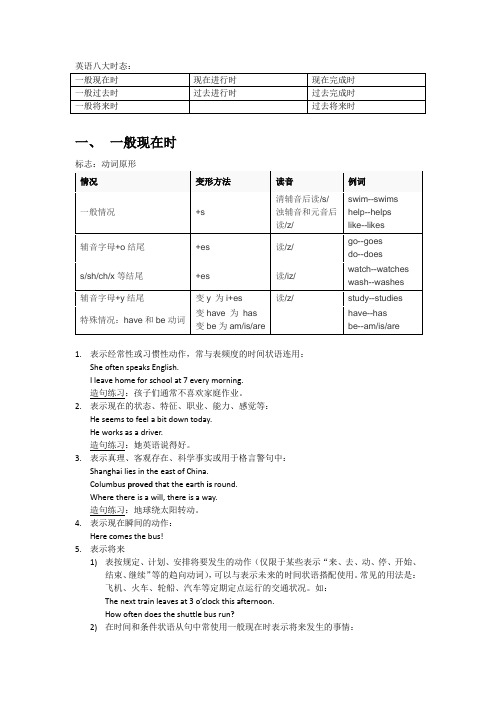
英语八大时态:一、一般现在时1.表示经常性或习惯性动作,常与表频度的时间状语连用:She often speaks English.I leave home for school at 7 every morning.造句练习:孩子们通常不喜欢家庭作业。
2.表示现在的状态、特征、职业、能力、感觉等:He seems to feel a bit down today.He works as a driver.造句练习:她英语说得好。
3.表示真理、客观存在、科学事实或用于格言警句中:Shanghai lies in the east of China.Columbus proved that the earth is round.Where there is a will, there is a way.造句练习:地球绕太阳转动。
4.表示现在瞬间的动作:Here comes the bus!5.表示将来1)表按规定、计划、安排将要发生的动作(仅限于某些表示“来、去、动、停、开始、结束、继续”等的趋向动词),可以与表示未来的时间状语搭配使用。
常见的用法是:飞机、火车、轮船、汽车等定期定点运行的交通状况。
如:The next train leaves at 3 o’clock this afternoon.How often does the shuttle bus run?2)在时间和条件状语从句中常使用一般现在时表示将来发生的事情:When Bill comes (不用will come), ask him to wait for me.I shall go there tomorrow unless I’m too busy.【练习题】①Nowadays, a large number of women, especially those who from the countryside, ___ in theclothing industry.A.is workingB.worksC.workD.worked②–What would you do if it ___ tomorrow?--We have to carry it on, since we’ve got everything already.A. rainB. rainsC. will rainD. is raining二、一般过去时标志:动词过去式1.表示过去某时所发生的动作或存在的状态,常与表示过去的时间状语连用(e.g. yesterday,this morning, just now, a moment ago, in May, last night / year / week, once upon a time, the other day, before …, when …, in the past等)。
英语必考八大时态结构及用法详解,初一、初二、初三均适用
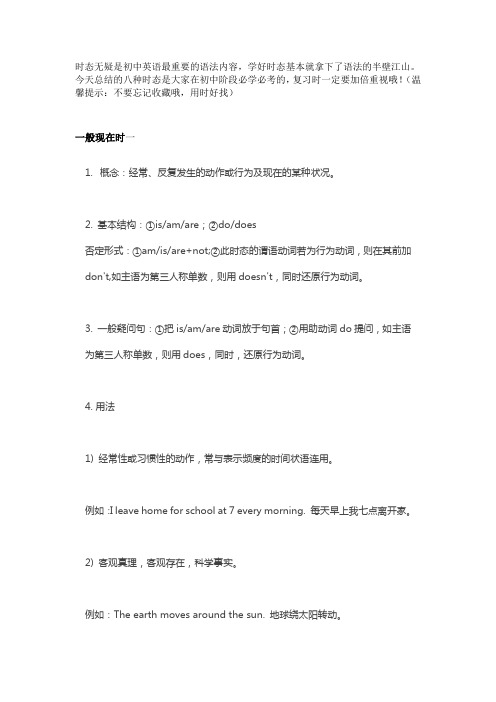
时态无疑是初中英语最重要的语法内容,学好时态基本就拿下了语法的半壁江山。
今天总结的八种时态是大家在初中阶段必学必考的,复习时一定要加倍重视哦!(温馨提示:不要忘记收藏哦,用时好找)一般现在时一1.概念:经常、反复发生的动作或行为及现在的某种状况。
2. 基本结构:①is/am/are;②do/does否定形式:①am/is/are+not;②此时态的谓语动词若为行为动词,则在其前加don't,如主语为第三人称单数,则用doesn't,同时还原行为动词。
3. 一般疑问句:①把is/am/are动词放于句首;②用助动词do提问,如主语为第三人称单数,则用does,同时,还原行为动词。
4. 用法1) 经常性或习惯性的动作,常与表示频度的时间状语连用。
例如:I leave home for school at 7 every morning. 每天早上我七点离开家。
2) 客观真理,客观存在,科学事实。
例如:The earth moves around the sun. 地球绕太阳转动。
Shanghai lies in the east ofChina. 上海位于中国东部。
3) 表示格言或警句。
例如:Pride goes before a fall. 骄者必败。
注意:此用法如果出现在宾语从句中,即使主句是过去时,从句谓语也要用一般现在时。
例如:Columbus proved that the earth is round. 哥伦布证实了地球是圆的。
4) 现在时刻的状态、能力、性格、个性。
例如:I don't want so much. 我不要那么多。
Ann writes good English but does not speak well.安英语写得不错,讲的可不行。
5) 一般现在时表示将来含义a. 下列动词come, go, arrive, leave, start, begin, return的一般现在时可以表示将来,主要用来表示在时间上已确定或安排好的事情。
英语必考八大时态结构及用法详解

英语必考八大时态结构及用法详解一、一般现在时1. 概念:经常、反复发生的动作或行为及现在的某种状况.2. 基本结构:①is/am/are;②do/does否定形式:①am/is/are+not;②此时态的谓语动词若为行为动词,则在其前加don't,如主语为第三人称单数,则用doesn't,同时还原行为动词.3。
一般疑问句:①把is/am/are动词放于句首;②用助动词do提问,如主语为第三人称单数,则用does,同时,还原行为动词.4。
用法1) 经常性或习惯性的动作,常与表示频度的时间状语连用.例如:I leave home for school at 7 every morning。
每天早上我七点离开家.2) 客观真理,客观存在,科学事实。
例如:The earth moves around the sun。
地球绕太阳转动.Shanghai lies in the east ofChina. 上海位于中国东部.3) 表示格言或警句。
例如:Pride goes before a fall. 骄者必败。
注意:此用法如果出现在宾语从句中,即使主句是过去时,从句谓语也要用一般现在时。
例如:Columbus proved that the earth is round. 哥伦布证实了地球是圆的.4) 现在时刻的状态、能力、性格、个性.例如:I don’t want so much。
我不要那么多.Ann writes good English but does not speak well.安英语写得不错,讲的可不行.5) 一般现在时表示将来含义a。
下列动词come,go, arrive, leave, start,begin, return的一般现在时可以表示将来,主要用来表示在时间上已确定或安排好的事情。
例如:The train leaves at six tomorrow morning。
初中英语动词八大时态详解
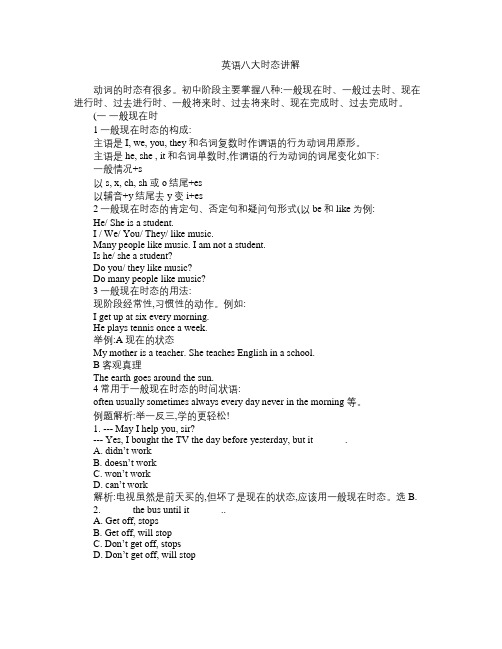
英语八大时态讲解动词的时态有很多。
初中阶段主要掌握八种:一般现在时、一般过去时、现在进行时、过去进行时、一般将来时、过去将来时、现在完成时、过去完成时。
(一一般现在时1一般现在时态的构成:主语是I, we, you, they和名词复数时作谓语的行为动词用原形。
主语是he, she , it和名词单数时,作谓语的行为动词的词尾变化如下:一般情况+s以s, x, ch, sh 或o结尾+es以辅音+y结尾去y变i+es2一般现在时态的肯定句、否定句和疑问句形式(以be和like为例:He/ She is a student.I / We/ You/ They/ like music.Many people like music. I am not a student.Is he/ she a student?Do you/ they like music?Do many people like music?3一般现在时态的用法:现阶段经常性,习惯性的动作。
例如:I get up at six every morning.He plays tennis once a week.举例:A 现在的状态My mother is a teacher. She teaches English in a school.B 客观真理The earth goes around the sun.4常用于一般现在时态的时间状语:often usually sometimes always every day never in the morning 等。
例题解析:举一反三,学的更轻松!1. --- May I help you, sir?--- Yes, I bought the TV the day before yesterday, but it ______.A. didn’t workB. doesn’t workC. won’t workD. can’t work解析:电视虽然是前天买的,但坏了是现在的状态,应该用一般现在时态。
初中英语八大时态讲解_图文
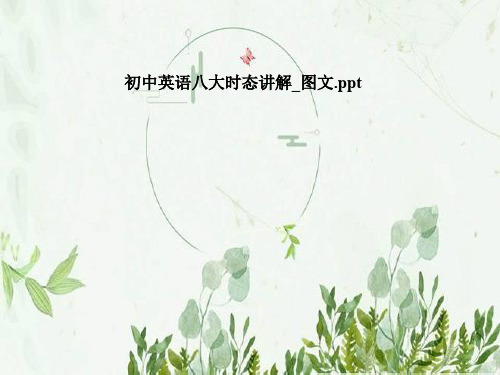
2 have been to+地点,表示“去过某地”
。(人已回) I have been to Europe. (I am not in Europe now.)
3 have been in+地点+时间段,表示“在/ 来某地多久”。
I have been in Europe for three weeks. (I am now still in Europe .)
go there get home open close get to know borrow buy
be there be home be open be closed know keep have
1.The film began 5 The film_h_a_s b_e_en_o_n__ for 5
• 9.They got to know 10 They_h_av_e_k_n_o_w_n__since 10
years ago.
years ago.
• 10.I borrowed the book a I_h_a_v_e _k_e_p_t _the book for a
week ago.
week.
二、一般过去时
1.用法:过去的动作或状态。
2.标志词:
yesterday, the day before yesterday,
three days ago, last night/week/month…,in the past;just
now=a moment ago
例题
Li Ming didn’t understand what American people
4.He joined the club 3 He__h_as_b_e_en_i_n__the club for
- 1、下载文档前请自行甄别文档内容的完整性,平台不提供额外的编辑、内容补充、找答案等附加服务。
- 2、"仅部分预览"的文档,不可在线预览部分如存在完整性等问题,可反馈申请退款(可完整预览的文档不适用该条件!)。
- 3、如文档侵犯您的权益,请联系客服反馈,我们会尽快为您处理(人工客服工作时间:9:00-18:30)。
2.结构:would was/were/going to +v.(原型)
试题:
1.--What did he say yesterday?
--He said he____to Sydney next week.
A.goes B.will go
C.would go D.are going
2.--Did your son fail his English exam once again?
1.The twinsw_e_r_e__w_a_s_h_i_n_g(wash) the
clothes at 9:00 yesterday.
2.Hew_a_s_p__la_y_i_n(gplay) basketball while
his mother was cooking.
3._W__a_s_ Sallys_in__g_in_g_(sing) when you
2.Light t_r_a_v_e_ls_(travel)faster than sound.
1.I often ___g_o__(go) to school by bike. 2.The earth _g_o_e_s__(go) around the sun.
3.Sally h_e_l_p_s__(help) her parents do the
结构: 主语+ have/has+过去分词 标志语:already, yet, so far, ever,
Since…/ for… in the last/ past few years
3.现在完成时和一般过去时的异同点: 1 共同点:动作都在过去。 2 不同点:和现在有无关系。(与现
在有关的过去动作用现在完成,与现在 无关的过去动作用一般过去。)
--Tomorrow.
A.do;leave
B.are;leaving
C.will;leaving
D.shall;leave
1.The twinsa_r_e__w__a_s_h_i_n_g(wash) the
clothes now.
2.Look! He _is__p_l_a_y_i_n(gplay) basketball
概念: 过去进行时态:
表示过去某一时刻或过去一段时间
内_正__在_进__行__的_动__作____________。
结构: 主语+be(was/were) doing
标志语:then, at eight yesterday ,
at this/that time yesterday,
when 、while
4.易错点:
1 have gone to+地点,表示“去了某地”。
(人已走,尚未回。只用于第三人称。)
They have gone to Europe. (They are not here.)
2 have been to+地点,表示“去过某
地”。(人已回) I have been to Europe. (I am not in Europe now.)
4.We are having ( have) a class meeting now. 5. __D_i_d__ he find (find) his bike yesterday? 6.Lily doesn’t _stay ( not stay) at home sometimes. 7. I visited (visit) Beijing two years ago. 8. Mom asked me __to__g_o____ (go) to bed early. 9. It took me 2 hours ___t_o_w__r_it_e___(write) it.
--Yes, but he told me he____hard next term.
A.studies B.is studying C.will studyD.would study
概念: 现在完成时态:
表示过去发生的动作持续到现在,也许 还要持续下去,或过去发生的动作对现 在造成的__影__响__或__结___果____________________
标志语jus:t now, in 1992,
last week/month
等表示过去的时间状语
1.The twins ___w_a__sh__e_d__(wash) the
clothes yesterday.
st Saturday afternoon he p__la_y__e_d__
(play) basketball over there.
8.They __w__er_e_ (be) at home yesterday afternoon. 9.She always __w_e_a_r_s_(wear) a red dress.
1.When __d_o_e_s he usually _p_r_a_c_t_ic_e___(practice) English?
over there.
3.Listen! _I_s____ Sally s_i_n_g_i_n_g_(sing)?
4.Can’t you see the babyis_s_l_ee_p_i_n_g_(sleep)?
5.My little brotheri_s_c_r_y_i_n_g(cry)these days.
went to visit her?
五、一般将来时 1.用法:将来的动作或状态。 2.结构:will
shal(l 第一人称) +V.(原型)
be going to 3.标志词:tomorrow,the day after tomorrow,in three days,in (the) future,next week/month/term…, from now on
例句:I was working.
一般将来时,
将 will加原型。
来 时
过去将来时, would加原型。
I will work.
I would work.
现在完成时,
完 have/has加过分。
成 时
过去完成时,
had 加过分。
I have worked.
I had worked.
各种时态的用法
10. _W_e_r_e_ (be) your parents in Shanghai in 2000?
11. I practice _s_p_e_a_k_in__g_( speak) English every day. 12. Do you enjoy __li_v_in_g____ (live) in Weihai? 13. I often watch my son _p_l_a_y___(play) Erhu. 14. It’s time for you __t_o_g_e_t____(get) up.
housework every Sunday.
4.The Kingsh_a_v__e__(have) a big party once
a year.
概念: 一般过去时态:
表_示__过_去__发__生_的__动__作_或__存__在_的__状__态_。
结构: 主语+ 动词过去式
yesterday、... ago、
back.
got married
过去的过去
came back
过去
现在
我来晚了! 没希望了!
终于结婚 了!好幸
福呀!
2.标志词:
by the end of…,by the time…,when+一般过去时
注意:
过去完成时是一种相对存在的时态,判定时必须根据 上下文找到一个可以作为参照点的过去时间,在此参照点 前发生的动作都可以用过去完成时。 1.We____learning 1000 words by the end of last term.
4.shall/will/be going to之间的区别:
1 shall往往用于第一人称疑问句, will可用于任何人称。
Which paragraph shall I read first?
Where we meet tomorrow?
A.shall
B.will
六、过去将来时
1.用法:从过去看将要发生的动作。
2.Heh_a_s__p_la_y__ed(play) basketball since
three years ago.
3.How long __h_a_s_ Sally _s_u_n_g__(sing)
yet?
八、过去完成时
现在完成时
1.用法:发生在 过去的过去的动作。 They had got married when he came
3 have been in+地点+时间段,表示“在/ 来某地多久”。
I have been in Europe for three weeks. (I am now still in Europe .)
1.The twins h__a_v_e_w__a_s_h_e_d(wash) the
clothes for an hour.
1. Emilie _ta_k__es_(take) the train to school every day. 2.It takes about ten minutest_o_w__a_lk(walk) to school. 3. _D__id___his grandpa___d_ie___(die) two years ago? 4.She ___r_e_a_d___ (read) a book last week. 5.She __w__a_s__(be) happy because she _f_o_u_n_d__ (find) her purse just now. 6.He went to school __t_o__g_et____(get) his bag. 7. Children __a_r_e__r_id_i_n_g____ (ride) bikes now.
